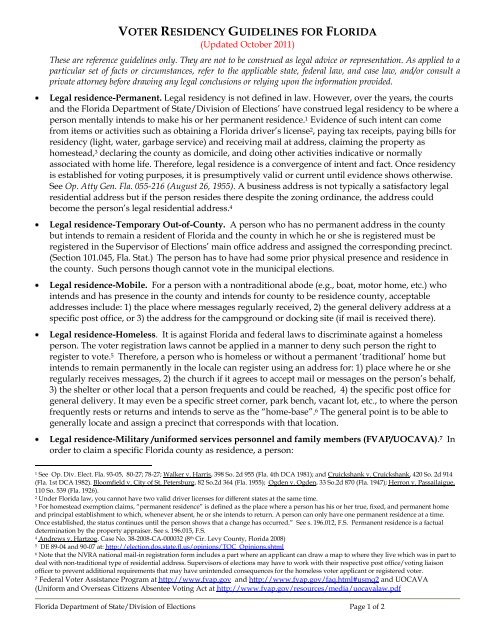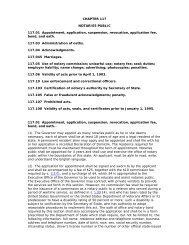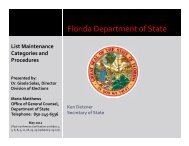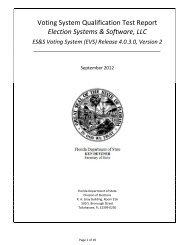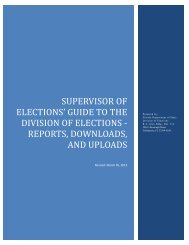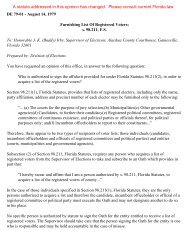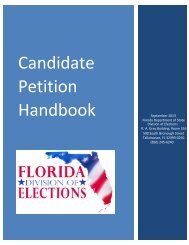Guidelines â Residency for Registrants - Florida Department Of State
Guidelines â Residency for Registrants - Florida Department Of State
Guidelines â Residency for Registrants - Florida Department Of State
Create successful ePaper yourself
Turn your PDF publications into a flip-book with our unique Google optimized e-Paper software.
VOTER RESIDENCY GUIDELINES FOR FLORIDA<br />
(Updated October 2011)<br />
These are reference guidelines only. They are not to be construed as legal advice or representation. As applied to a<br />
particular set of facts or circumstances, refer to the applicable state, federal law, and case law, and/or consult a<br />
private attorney be<strong>for</strong>e drawing any legal conclusions or relying upon the in<strong>for</strong>mation provided.<br />
Legal residence-Permanent. Legal residency is not defined in law. However, over the years, the courts<br />
and the <strong>Florida</strong> <strong>Department</strong> of <strong>State</strong>/Division of Elections‟ have construed legal residency to be where a<br />
person mentally intends to make his or her permanent residence. 1 Evidence of such intent can come<br />
from items or activities such as obtaining a <strong>Florida</strong> driver‟s license 2 , paying tax receipts, paying bills <strong>for</strong><br />
residency (light, water, garbage service) and receiving mail at address, claiming the property as<br />
homestead, 3 declaring the county as domicile, and doing other activities indicative or normally<br />
associated with home life. There<strong>for</strong>e, legal residence is a convergence of intent and fact. Once residency<br />
is established <strong>for</strong> voting purposes, it is presumptively valid or current until evidence shows otherwise.<br />
See Op. Atty Gen. Fla. 055-216 (August 26, 1955). A business address is not typically a satisfactory legal<br />
residential address but if the person resides there despite the zoning ordinance, the address could<br />
become the person‟s legal residential address. 4<br />
Legal residence-Temporary Out-of-County. A person who has no permanent address in the county<br />
but intends to remain a resident of <strong>Florida</strong> and the county in which he or she is registered must be<br />
registered in the Supervisor of Elections‟ main office address and assigned the corresponding precinct.<br />
(Section 101.045, Fla. Stat.) The person has to have had some prior physical presence and residence in<br />
the county. Such persons though cannot vote in the municipal elections.<br />
Legal residence-Mobile. For a person with a nontraditional abode (e.g., boat, motor home, etc.) who<br />
intends and has presence in the county and intends <strong>for</strong> county to be residence county, acceptable<br />
addresses include: 1) the place where messages regularly received, 2) the general delivery address at a<br />
specific post office, or 3) the address <strong>for</strong> the campground or docking site (if mail is received there).<br />
Legal residence-Homeless. It is against <strong>Florida</strong> and federal laws to discriminate against a homeless<br />
person. The voter registration laws cannot be applied in a manner to deny such person the right to<br />
register to vote. 5 There<strong>for</strong>e, a person who is homeless or without a permanent „traditional‟ home but<br />
intends to remain permanently in the locale can register using an address <strong>for</strong>: 1) place where he or she<br />
regularly receives messages, 2) the church if it agrees to accept mail or messages on the person‟s behalf,<br />
3) the shelter or other local that a person frequents and could be reached, 4) the specific post office <strong>for</strong><br />
general delivery. It may even be a specific street corner, park bench, vacant lot, etc., to where the person<br />
frequently rests or returns and intends to serve as the “home-base”. 6 The general point is to be able to<br />
generally locate and assign a precinct that corresponds with that location.<br />
Legal residence-Military /uni<strong>for</strong>med services personnel and family members (FVAP/UOCAVA). 7 In<br />
order to claim a specific <strong>Florida</strong> county as residence, a person:<br />
1<br />
See Op. Div. Elect. Fla. 93-05, 80-27; 78-27; Walker v. Harris, 398 So. 2d 955 (Fla. 4th DCA 1981); and Cruickshank v. Cruickshank, 420 So. 2d 914<br />
(Fla. 1st DCA 1982). Bloomfield v. City of St. Petersburg, 82 So.2d 364 (Fla. 1955); Ogden v. Ogden, 33 So.2d 870 (Fla. 1947); Herron v. Passailaigue,<br />
110 So. 539 (Fla. 1926).<br />
2<br />
Under <strong>Florida</strong> law, you cannot have two valid driver licenses <strong>for</strong> different states at the same time.<br />
3<br />
For homestead exemption claims, “permanent residence” is defined as the place where a person has his or her true, fixed, and permanent home<br />
and principal establishment to which, whenever absent, he or she intends to return. A person can only have one permanent residence at a time.<br />
Once established, the status continues until the person shows that a change has occurred.” See s. 196.012, F.S. Permanent residence is a factual<br />
determination by the property appraiser. See s. 196.015, F.S.<br />
4<br />
Andrews v. Hartzog, Case No. 38-2008-CA-000032 (8 th Cir. Levy County, <strong>Florida</strong> 2008)<br />
5<br />
DE 89-04 and 90-07 at: http://election.dos.state.fl.us/opinions/TOC_Opinions.shtml<br />
6<br />
Note that the NVRA national mail-in registration <strong>for</strong>m includes a part where an applicant can draw a map to where they live which was in part to<br />
deal with non-traditional type of residential address. Supervisors of elections may have to work with their respective post office/voting liaison<br />
officer to prevent additional requirements that may have unintended consequences <strong>for</strong> the homeless voter applicant or registered voter.<br />
7 Federal Voter Assistance Program at http://www.fvap.gov and http://www.fvap.gov/faq.html#usmq2 and UOCAVA<br />
(Uni<strong>for</strong>m and Overseas Citizens Absentee Voting Act at http://www.fvap.gov/resources/media/uocavalaw.pdf<br />
<strong>Florida</strong> <strong>Department</strong> of <strong>State</strong>/Division of Elections Page 1 of 2
1. Must have or had physical presence in the state and simultaneously have the intent to remain or<br />
make the <strong>Florida</strong> his or her home or domicile.<br />
2. May only have one legal residence at a time, but may change residency each time he or she is<br />
transferred to a new location.<br />
3. Must make a conscious decision to change residency as exemplified by such acts as registering to<br />
vote, registering a car, qualifying <strong>for</strong> in-state tuition, etc.<br />
4. May not revert to the previous residence without re-establishing new physical presence and intent<br />
to remain or return.<br />
Uni<strong>for</strong>med service personnel and their family members cannot arbitrarily choose which state to declare as their legal<br />
voting residence without first meeting the state's residency requirements. Marriage to an active duty member does<br />
not automatically confer the same legal residence. <strong>Florida</strong>‟s intent and physical presence criteria must still<br />
be met independently. A minor typically assumes either one of the parent‟s legal residence. There<strong>for</strong>e, it is<br />
possible <strong>for</strong> members of the same military family to have different legal residences. Once a minor turns 18,<br />
he or she can establish his or her own residency (which can be different from either parent), provided he or<br />
she has physical presence and intent to remain or return.<br />
The Military Spouse <strong>Residency</strong> Relief Act of 2009 8 (MSRRA)gives a military spouse the right to retain<br />
residency status (<strong>for</strong> voting or taxation purposes) in the same state as the military member when the couple<br />
has to relocate from the state due to military orders. It presumes that the couple share the same<br />
domicile/legal residency state <strong>for</strong> voting (and/or taxation purposes) in the first place which is not always<br />
the case. If they didn‟t have the same state domicile/legal residency state to begin with or they abandoned<br />
the residency state, the military spouse (and/or dependent family member) cannot pick and choose state of<br />
residency, the person would have to independently meet the state‟s residency requirements be<strong>for</strong>e being<br />
able to retain the residency in the state be<strong>for</strong>e relocating.<br />
Legal residence- Overseas Citizens. 9 An overseas citizen‟s residence is the last state in which he or she<br />
resided immediately prior to leaving the U.S. This right extends to an overseas citizen even if he or she no<br />
longer owns property or has no other ties to the last state of residence and his or her intent to return to that<br />
state may be uncertain. In the latter case, such overseas citizen is technically temporarily residing outside<br />
the county and could not vote in municipal elections. 10 Where a person registers/votes is a factor used to<br />
determine residency under federal, state or local tax laws except when the person only exercises the right to<br />
vote solely in elections <strong>for</strong> federal offices.<br />
Legal residence-U.S. citizen born or living abroad. A U.S. citizen who is born or living abroad and has<br />
never lived in <strong>Florida</strong> is not permitted to register or vote in <strong>Florida</strong> under current <strong>Florida</strong> law.<br />
Legal residence-College/University Student. 11 Students constitute a significant percentage of 1 st time<br />
registrants/voters. A student‟s residential address is the address the student intends to be his or her<br />
permanent address as stated on the application—just like any other applicant who affirms indefinitely a<br />
<strong>Florida</strong> legal residential address and no matter how long he or she ends up staying (the student may leave<br />
<strong>for</strong> a summer or after 2 or 4 years). A communal university mail address is satisfactory, even if the driver‟s<br />
license lists a different address. That does not negate the requirement to provide a <strong>Florida</strong> driver‟s license or<br />
social security number (if he or she has one) <strong>for</strong> registration.<br />
8 Public law 111-97 (signed into law 11/15/09 http://frwebgate.access.gpo.gov/cgibin/getdoc.cgi?dbname=111_cong_bills&docid=f:s475enr.txt.pdf<br />
; Senate Report 111-46 regarding MSRRA;<br />
http://www.gpo.gov/fdsys/pkg/CRPT-111srpt46/pdf/CRPT-111srpt46.pdf.<br />
9 Cf. footnote 6.<br />
10 Section 101.045, F.S..<br />
11 Every college and university must have registration <strong>for</strong>ms available <strong>for</strong> students. See Higher Education Act of 1998. <strong>Florida</strong> law<br />
requires qualifying education institutes to provide students at least annually the opportunity to register or update their records. S.<br />
97.0583, F.S.<br />
<strong>Florida</strong> <strong>Department</strong> of <strong>State</strong>/Division of Elections Page 2 of 2


